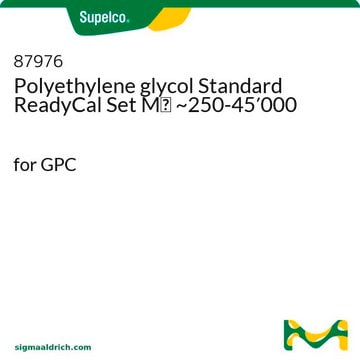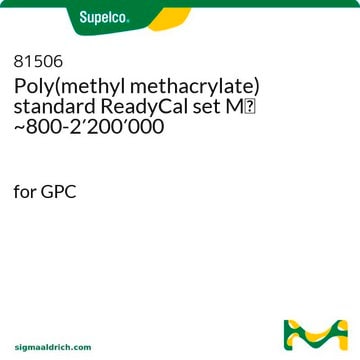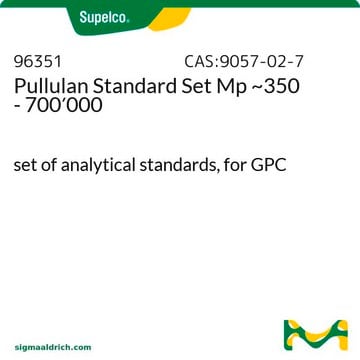76552
Polystyrene (low molecular) Standard ReadyCal Set M(p) ~250-65000
for GPC
Přihlásitk zobrazení cen stanovených pro organizaci a smluvních cen
About This Item
UNSPSC Code:
41116107
NACRES:
NA.24
Doporučené produkty
grade
for GPC
Quality Level
shelf life
limited shelf life, expiry date on the label
technique(s)
gel permeation chromatography (GPC): suitable
format
neat
storage temp.
2-8°C
Application
- Low molecular weight polystyrene standards for gel permeation chromatography: The characterization of branched ultrahigh molar mass polymers using asymmetrical flow field-flow fractionation and size exclusion chromatography highlighted the essential role of low molecular weight polystyrene standards in determining polymer distribution and characteristics, contributing significantly to advances in polymer science research (Otte et al., 2011).
Components
ReadyCal Standards are polymer cocktails pre-weighed into autosampler vials for the convenient calibration of GPC/SEC/GFC systems.
This kit contains 10 sets of 3 color-coded vials, each containing four polystyrenes of different molar masses. Molar masses range from ~266 to ~66,000 Da and are carefully selected so that polymer traces are baseline separated.
Sufficient material provided for at least 10 calibrations.
Suitable for calibrations in THF, toluene, DMF, DMAc, chloroform, TCB, DCB and NMP.
This kit contains 10 sets of 3 color-coded vials, each containing four polystyrenes of different molar masses. Molar masses range from ~266 to ~66,000 Da and are carefully selected so that polymer traces are baseline separated.
Sufficient material provided for at least 10 calibrations.
Suitable for calibrations in THF, toluene, DMF, DMAc, chloroform, TCB, DCB and NMP.
Storage Class
11 - Combustible Solids
flash_point_f
No data available
flash_point_c
No data available
Vyberte jednu z posledních verzí:
Již tento produkt vlastníte?
Dokumenty související s produkty, které jste v minulosti zakoupili, byly za účelem usnadnění shromážděny ve vaší Knihovně dokumentů.
Zákazníci si také prohlíželi
Barbara De Meester et al.
Nature communications, 11(1), 5020-5020 (2020-10-08)
Lignin causes lignocellulosic biomass recalcitrance to enzymatic hydrolysis. Engineered low-lignin plants have reduced recalcitrance but often exhibit yield penalties, offsetting their gains in fermentable sugar yield. Here, CRISPR/Cas9-generated CCR2(-/*) line 12 poplars have one knockout CCR2 allele while the other
Náš tým vědeckých pracovníků má zkušenosti ve všech oblastech výzkumu, včetně přírodních věd, materiálových věd, chemické syntézy, chromatografie, analytiky a mnoha dalších..
Obraťte se na technický servis.





